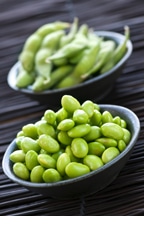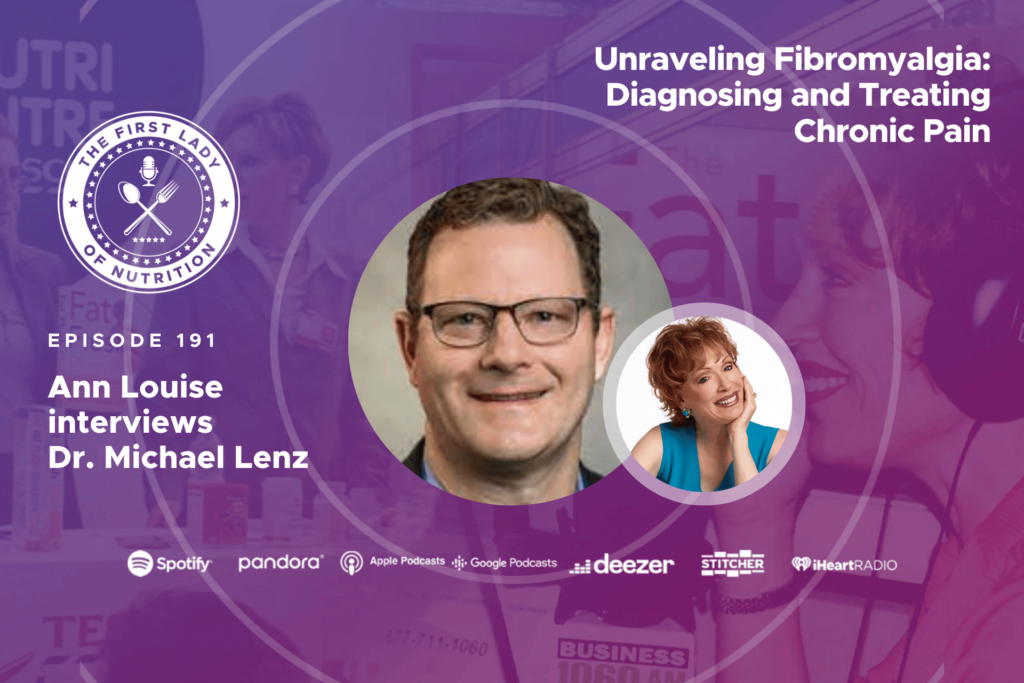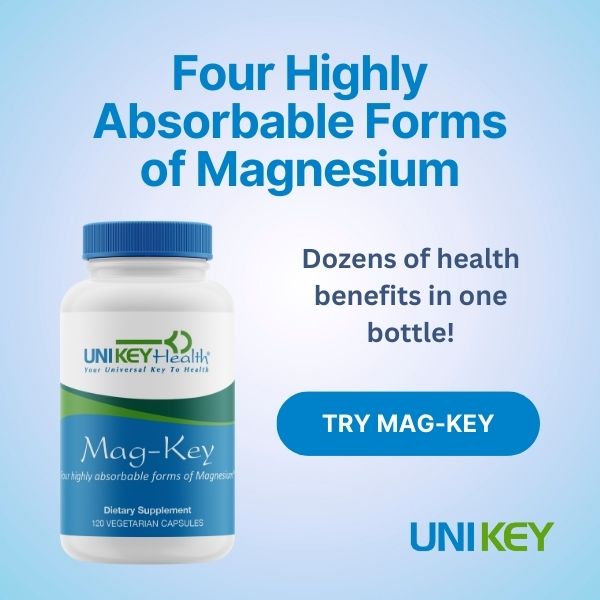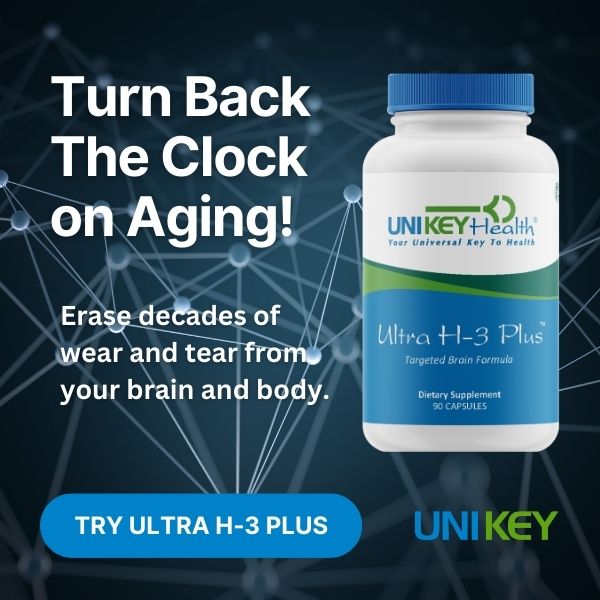This bean causes allergies, is high in copper, and upsets hormone balance.
 Soy is everywhere. Besides feeding animals, the soybean finds its way into a host of processed foods including many “health foods.”
Soy is everywhere. Besides feeding animals, the soybean finds its way into a host of processed foods including many “health foods.”
Baked goods, cereals, cheese, flour, hydrolyzed plant protein, milk, miso, snacks like tacos and soy “nuts,” soy sauce and tamari, tempeh, tofu, texturized vegetable protein, vegetable broths, and even yogurt are made from soy. Soy is also used in baby formula, making it one of the first allergies that infants and young children develop.
This popular legume is among the top 10 allergens. One reason may be that 90% of soybeans are genetically modified—and no one has adequately assessed the allergenic effects of genetically modified organisms (GMOs) on humans.
Another reason may be soy’s popularity as a livestock feed. This lowly bean makes it way up the food chain, so it’s hard today to eat something that doesn’t contain soy.
Soy allergy symptoms range from skin conditions like acne and eczema to hay fever and asthma to colitis and other gastrointestinal (GI) problems like diarrhea. It can even lead to anaphylaxis, a potentially deadly allergic reaction.
That’s not all! Soybeans (like other beans and grains) contain non-nutritive phytic acid that blocks mineral (calcium, iron, magnesium, and zinc) absorption, making its use a concern from infancy on. And soy contains enzyme inhibitors, which make it difficult for the body to digest this vegetable protein.
Only after a long period of fermentation (used in miso and tempeh) is soy really digestible. Most of the population studies that show long-term benefits involve fermented soy, a traditional Asian food.
That’s very different from manufactured soy foods and ingredients, which use only certain parts of the soybean. This kind of soy contains high levels of the heavy metal aluminum, which is toxic to kidneys and the nervous system, and MSG, another neurotoxin. The processing of soy protein creates other toxins, including cancer-causing nitrosamines.
In addition, soy contains genistein and isoflavones, substances that act like estrogen in the body. That explains why soy can block thyroid hormones.
Dr. Ann Louise’s Take:
Phytoestrogens potentially lead to infertility and breast cancer, although the research (mostly done by soy manufacturers) is mixed. One recent review of genistein by a pharmaceutical company recommends that postmenopausal women use this plant estrogen for no more than three years.
The debate over soy isoflavones is even more controversial, which is one reason I don’t recommend soy foods or supplements to my clients. Even Mark Messina, PhD, executive director of the Soy Nutrition Institute, recommends against eating too much soy (more than three servings a day). That’s still way too much!
Protect Hormone Health
Phytoestrogens disrupt endocrine function. For example, infants fed soy formula may have up to 22,000 times more estrogen in their blood than babies fed other formula. Some experts believe this may explain early menstruation and physical development in girls and underdevelopment in boys.
Just 30 mg of soy isoflavones a day has a negative impact on thyroid function. That equals the isoflavones in 5 to 8 ounces of soy or just 1½ ounces of miso. High levels of soy have been linked to goiter. Any woman who has or suspects thyroid problems should avoid soy.
Safe Vegetarian Protein
Protein is an important source of steady energy, especially for anyone trying to lose weight and keep it off. This nutrient also helps relieve water-logged tissues.
When the body is deficient in protein, fluid leaks from vascular spaces into the spaces between the cells and gets trapped there. This results in bloating (water retention), cellulite, and water-weight gain.
One alternative to soy is whey protein, especially in the form of a pure, denatured, and unheated protein powder like Fat Flush Whey Protein. It supports production of the powerful antioxidant glutathione, which fights toxins, aging, and disease. Each serving has 20 grams of 100% bioactive protein, along with naturally occurring healing substances: lactoferrin (an iron-modulating protein), immunoglobulins and other immune enhancers, useful peptides, and natural appetite suppressors.
For vegans (or anyone allergic to whey), Fat Flush Body Protein is a delicious combination of yellow pea protein and brown rice. It’s 100% hypoallergenic (both dairy and gluten free) and contains no GMOs. Sweetened with all-natural stevia (a calorie-free herb) and inulin (a prebiotic that nourishes beneficial bacteria in the GI tract), Fat Flush Body Protein supports high energy levels, putting an end to cravings.
Soy Sensitive?
I avoid soy like the plague because it’s one more unnecessary source of copper. Copper toxicity is increasingly common today due to birth control pills, copper cookware and pipes, dental material, and diet (brewer’s yeast, cocoa, seafood, nuts, seeds, and tea). Copper imbalances also result from molybdenum and zinc deficiencies.
High levels of copper have been linked to acne, anemia, candida yeast infections, elevated estrogen, lower libido, PMS, osteoporosis, rheumatoid arthritis, and a variety of nervous disorders including depression. To rebalance your body’s supply of minerals, eat zinc-rich eggs, grass-fed meat, and poultry. And take my copper-free, hypoallergenic Female Multiple from UNI KEY, specially formulated for copper-sensitive women.
Sources:
https://www.soyonlineservice.co.nz/
www.healingdaily.com/detoxification-diet/soy.htm









22 Responses
WOW!!! So what do we do if we drink/use soymilk because rice milk is so much more expensive. Are we any safer with organic soy????????
thanks
My feet are numb & tingley. They are always cold.
Any idea what would cause this?
I do have mild neuropathy in my feet.
Thanks for your advice.
I lost 30 pounds on the fat flush plan several years ago & have kept most of it off.
Still drink the cranwater with flax seed daily.
Have you tried almond milk? I like it better than soy.
Not sure if almond milk is FF compliant though.
Okay…why recommend GRAIN fed meet? Was that a typo…did you mean to say GRASS fed meet? I imagine I don’t even have to comment on the difference and the health hazards associated with grain-fed animals.
Thank you for catching the typo, ‘grass-fed’ beef is the correct version.
I am desperate to figure out something else to feed my baby. I tried hard not to supplement, but after a very traumatic birth I was never able to let down. Or, I really didn’t have enough milk to feed my baby. We started him on dairy formula and he developed SEVERE eczema. We didn’t sleep or have a moment without anxiety and worry for 8 months. Then, we switched to soy formula. The eczema has gotten better, but it’s nowhere near gone. I hate having him consume so much so, but I don’t know what else to feed him. He won’t eat the hypoallergenic formulas, but they are awful anyway. What can we do???!!
Sheryl & Diane:
Have you tried raw milk?
Sue:
I, too, was surprised with the recommendation of meat from grain fed animals rather than grass fed animals, especially with there being a link to a Weston Price related website.
Yes, we keep trying raw dairy, but he has a really tough time digesting it and ends up with a lot of gas and it has flared the eczema a bit too. We try, then back off and wait and then try again, but so far it hasn’t worked out. I would also be happy if he was interested in solids, but he doesn’t want anything to do with it. I want to make my own formula, but am fearful that I won’t give him the right proportions/nutrients. We do give him bifidus, cod liver oil, coconut oil, vitamin D and a multi vitamin. Anyone have any thoughts of making a formula with coconut milk or rice milk?
How do I find out if I have copper imbalance?
Hello All: Well, I like goat’s milk better than soy, any day. Watch out for those almond milks on the market, they are often laced with varous types of sugar. Cream – organic cream – that is diluted half with pure water would be much better for children. Since cream is a fat, it is digested differently than milk.
To find out about copper imbalance, take a TMA on this site or call UNI KEY at 1 -800-888-4353.
YES, black cohosh contains copper. Take the TMA and see what your levels are before stopping the dosage – which seems to be working.
Sorry about the typo, what was I thinking
The article does say grass fed. As for milk for
your baby…I have raised two very healthy children
on raw organic goat milk. It’s as close to human milk
as we can get. I found local people that milked their goats.
You do need to make sure they keep their goats clean and the jars clean. Best to know the person. If you do not know anyone that has goats, pastuerized goat milk from the store would be my second choice, but organic raw goat milk is certainly best. Good luck!
And thank you for the great information Ann Louise!
Happy holidays to you and your family!
Oh yes. One last thought on goats milk. Your baby has a hard time digesting and has gas….I added a half capsule of digestive enzymes to each bottle of milk and it made all the difference. No more gas. (hint: Digestive enzymes will curdle the milk by breaking it down so you quickly learn that you don’t put enzymes in until you are ready to give it to your baby, and don’t full the bottle with more milk than the baby will drink or you will waste the milk.) As I said… I raised two babies this way and they were exclusively milk fed until the age of 14 months.
Excellent discussion.
Good information. We recently watched the Food inc documentary. It has some really good information about our food and what not to eat. I have been avoiding soy for sometime due to a hypo-thyroid, and after watching that film. I would never ever eat a soy bean that was genetically engineered. That cannot be healthy for any living thing.
I don’t eat soy anymore (since fat flush plan) but before that I ate alot of soy, 2 or 3 times a day and have always thanked it for my easy menopause–no hot flashes, night sweats etc. I don’t have any of the problems mentioned above. I made sure the soy products I used said non gmo
My 7 yr old daughter has been on soy since I stopped breastfeeding (around 6 mos). I couldn’t keep up with her demand. I was 42 at the time.
She is allergic to cow dairy and all tree nuts. She drinks a LOT of soymilk. What in the world can I give her?
What about organic cream? It is not digested as a protein but as a fat. Diluted half and half it is very nutritive. Lots of soymilk is just not the answer, I am afraid for long term health.
I’m a vegan and am aware if some of the dangers of soy so use rice and almond dairy products when I can. I still use a lot of soy however and think I’m doing much better for my health as well as animals health by choosing not to eat them or their products. I also buy as much organic as I can find. Does that help?
Diane: It looks like Tamera and I are blessed with friends from whom we can get raw goats milk. My friend is very meticulous when it comes to hygiene of the goats’ udders, her hands, everything that comes in contact with the milk. We clean and sterilize our own jars.
I’m in the Virginia Beach, VA area if you happen to be anywhere close. I can give you my friend’s info. Since she can’t sell it on the market, we just buy our own share of the goat herd, and she milks it for us.
When it’s fresh from the goat, it’s just as sweet as cow’s milk.
Ann Louise, for someone with celiac on a gluten free diet, who is severly allergic to citrus( lemon, limes, organges, grapefruits)what can be substituted for the lemon water or citrus selections you have made in your diet so the diet is just as effective?
Dawnmarie: Can you use a bit of apple cider vinegar to replace the lemon water – a teaspoon instead of the recommended lemon? To substitute for the citrus, you will simply have to avoid all citrus and use berries where appropriate
Ann Louise, apple cider vinegar I can have – yes. And I have no problem with berries – perfact.. thank you very much.